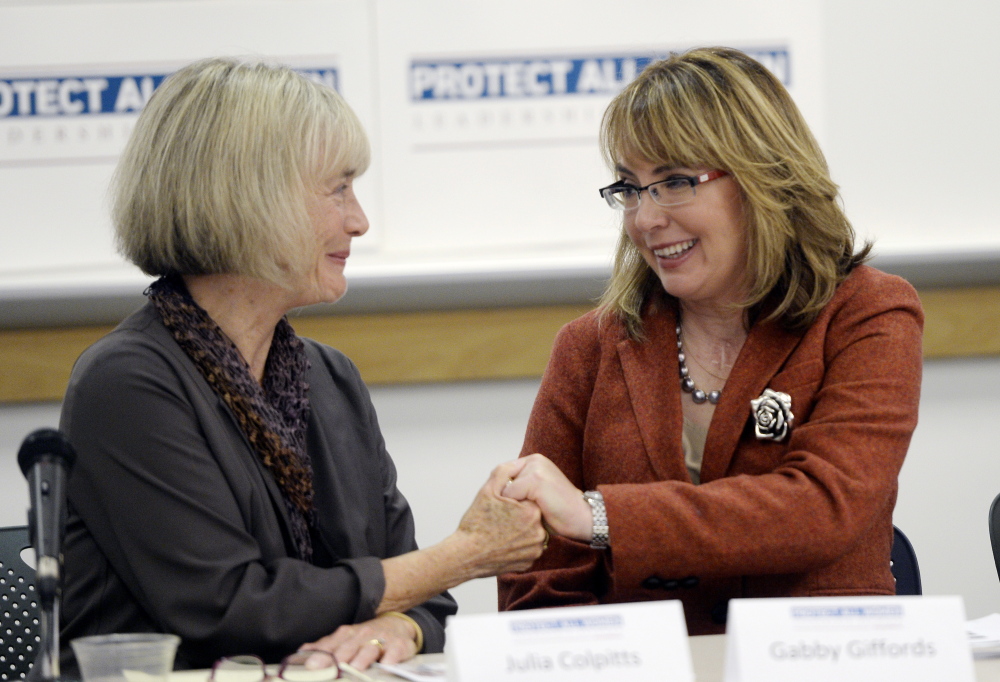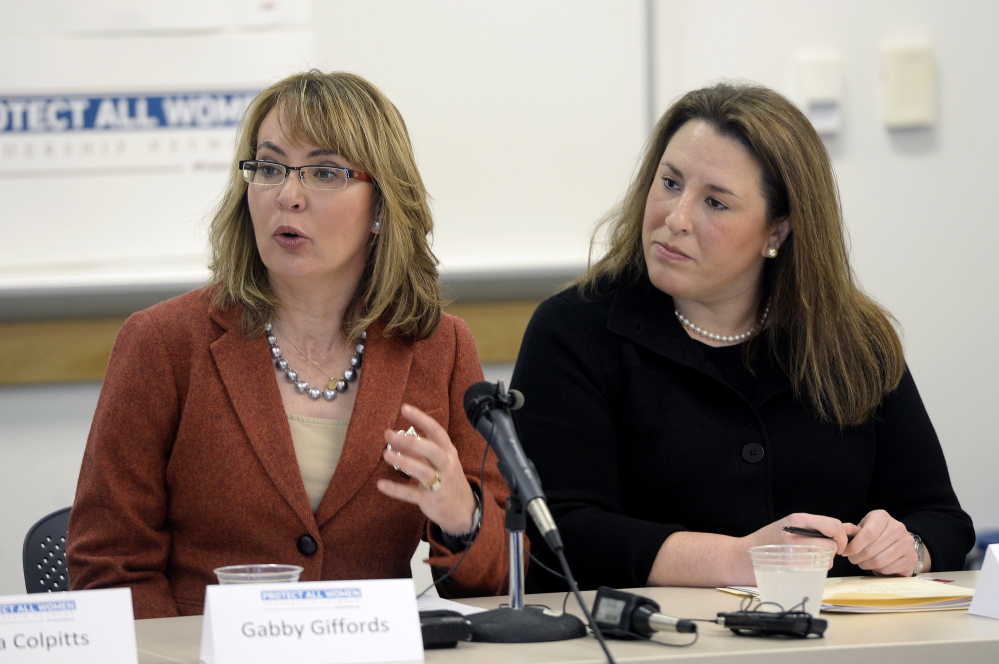Former Arizona U.S. Rep. Gabby Giffords began a nine-state tour in Portland on Tuesday to increase pressure on state and federal lawmakers to enact gun control laws that protect women from gun violence.
Giffords, who is still recovering from severe head injuries she suffered when she was shot in 2011, spoke for only about 15 seconds. With a cane in her left hand, she walked into a conference room at the University of Southern Maine’s Muskie School of Public Service with a slight limp and greeted those in the room with an enthusiastic hello.
“Dangerous people with guns are a threat to women. Stalkers with guns, abusers with guns … make gun violence a women’s issue, for mothers, for families, for me and for you,” Giffords said with some effort. “We can lead the way. We stand for common sense. We stand for responsibility. We can change our laws. We can win elections. Please join your voice with mine.”
Giffords is the founder of the Americans for Responsible Solutions, a nonprofit group that advocates for “common sense” gun control laws such as expanded background checks, and which also operates a political action committee.
In July, the Democrat launched the Protect All Women Leadership Network to focus on gun violence against women – most often from spouses or stalkers. Of the 48 homicides in Maine in 2010 and 2011, 21 were domestic violence and 66 percent of the victims were female, according to the PAC.
After her brief remarks, Giffords and the PAC’s executive director, Hayley Zachary, listened intently as a group of nearly two dozen advocates for women and gun control talked about the scope of the problem and potential solutions.
Most of the comments focused on a disconnect among Maine lawmakers, who consider themselves strong on domestic violence issues but are reluctant to pass gun control measures.
“You can’t be good on domestic violence and bad on gun control at the same time,” said Emma Connor, director of Maine Citizens Against Handgun Violence.
Other participants called attention to loopholes in state law that make it easy for someone who’s ordered by a court to relinquish firearms to buy new ones. Also, there is no way to track whether someone under a court order has in fact relinquished the weapon.
The lack of background checks for private sales and the availability of information about mentally ill people who have been voluntarily committed are also a challenge. However, the lack of political will to enact even modest gun control measures was a constant theme.
Julia Colpitts, executive director of the Maine Coalition to End Domestic Violence, said she is compiling a list of potential law changes recommended by three separate task forces – the governor’s task force on firearms, the Maine Commission on Domestic and Sexual Abuse, and the Domestic Abuse Homicide Panel.
Colpitts said compliance with orders to relinquish firearms should be reported back to the courts, and police should have more authority to enter homes to ensure that all firearms are relinquished. Also, background checks should be required for private gun sales, she said.
Portland Police Chief Michael Sauschuck said it is “disturbing” that even though about 80 percent of Mainers support stronger background checks, the Legislature and the governor have yet to act, especially on private sales.
“Domestic violence is really the core of this conversation, and that’s where women are losing their lives every single day in this country. Yet there is still that difficulty of moving this forward from a political standpoint,” Sauschuck said. “(In) the governor’s race, they should be talking about this all the time. The only way to get this conversation started, or get your foot in the door in many cases, is with a domestic violence approach.”
Giffords and her husband also appeared at a private fundraiser last summer for U.S. Rep. Mike Michaud’s gubernatorial campaign.
After visiting Maine, Giffords was scheduled to go to New Hampshire, Connecticut, Pennsylvania, Arizona, Minnesota, Iowa, Oregon and Seattle.
The Americans for Responsible Solutions PAC made an independent expenditure of $226,000 in support of Republican U.S. Sen. Susan Collins’ re-election campaign, according to the Center for Responsive Politics.
Send questions/comments to the editors.




